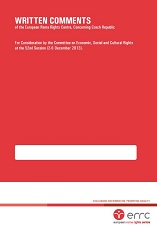WRITTEN COMMENTS OF THE EUROPEAN ROMA RIGHTS CENTRE CONCERNING ROMANIA (For consideration by the United Nations Committee Against Torture, at its 54th session 20 April to 15 May 2015)
WRITTEN COMMENTS OF THE EUROPEAN ROMA RIGHTS CENTRE CONCERNING ROMANIA (For consideration by the United Nations Committee Against Torture, at its 54th session 20 April to 15 May 2015)
Author(s): Author Not Specified
Subject(s): Education, Public Administration, Welfare systems, Evaluation research, Social differentiation, Studies in violence and power, Health and medicine and law, Ethnic Minorities Studies
Published by: European Roma Rights Center
Keywords: Romania; Roma; human rights; racism; justice; education; housing; health care; public services; discrimination; violence;
Summary/Abstract: 1. The European Roma Rights Centre (ERRC) respectfully submits written comments concerning Romania for consideration by the Committee Against Torture at its 54th Session. The ERRC is an international public interest law organisation engaging in a range of activities aimed at combating anti-Romani racism and human rights abuse of Roma, in particular strategic litigation, international advocacy, research and policy development, and human rights training. Since its establishment in 1996, the ERRC has endeavoured to provide Roma with the tools necessary to combat discrimination and achieve equal access to justice, education, housing, health care, and public services. 2. Regular monitoring of the human rights situation of Roma in Romania has been undertaken by the ERRC and other NGOs. The analysis of the Romanian legal framework is informed by our extended litigation experience in both domestic and international forums. 3. After a brief overview of anti-Roma attitudes in Romania, this submission follows the order in the List of Issues Prior to Reporting. While the issues highlighted are often of a general interest, the ERRC is convinced that they have a disproportionate impact on Roma, given Romania’s history of discrimination against and exploitation of Roma, as well as enduring stereotypes and hostility towards them. The present document does not aim to address all issues of relevance to the implementation of the Convention or its provisions in Romania, nor is it a comprehensive summary of all human rights issues facing Roma in Romania. 4. According to current unofficial estimates, Roma in Romania make up approximately 9% of the population (approximately 1,850,000). However, a verified and accurate count remains elusive. According to the final results of the 2011 Census of the Population and Households published on 4 July 2013 by the National Statistics Institute, Romania had a total population of 20.12 million. Among the 18.88 million respondents who self-reported their ethnicity, 621,600 were Roma (3.3%, an increase from 2.46% in the 2002 census). 5. Deeply entrenched anti-Roma attitudes can be vividly seen in the annual surveys carried out by the National Council for Combating Discrimination (NCCD): in 20052 61% of respondents thought that Roma were a source of shame for Romania, while 52% of respondents went further to say that Roma should not be allowed to travel outside the country. These attitudes have not improved much: in 20133 48% of respondents said that they did not want a Roma work colleague, 41% would not want a Roma neighbour, and 38% would not want any Roma in their municipality. Public authorities are not insulated from these wide-spread and pernicious attitudes; in the absence of robust safeguards these attitudes may translate into violations of the Convention. 6. In recent years international monitoring bodies have expressed particular concern about the rise in anti-Roma rhetoric and racism in Romania. For instance, the European Commission against Racism and Intolerance (ECRI) noted in its 2014 report that “Stigmatising statements against Roma are common in the political discourse, encounter little criticism and are echoed by the press, the audiovisual media and on the Internet. No effective mechanism is in place to sanction politicians and political parties which promote racism and discrimination.” Similarly, the UN Committee on the Elimination of Racial Discrimination (“CERD”) stated in its 2010 Concluding Observations on Romania that it was “concerned at reports of the spread of racial stereotyping and hate speech aimed at persons belonging to minorities, particularly Roma, by certain publications, media outlets, political parties and certain politicians”. 7. CERD also expressed its concern regarding “the excessive use of force, ill-treatment and abuse of authority by police and law enforcement officers against persons belonging to minority groups, and Roma in particular”. 8. The climate of impunity for hate speech, stigmatisation, and discrimination is compounded by the absence of a robust framework to address anti-Roma violence, in particular violence perpetrated by the police. Again according to ECRI, as of 2014 “No significant steps have been taken to ensure compliance with the principle of non-discrimination by the police or to enquire as to the reasons why no complaints have been lodged against police officers”.
Series: Papers submitted to OHCR and related Commissions
- Page Count: 8
- Publication Year: 2015
- Language: English
- Content File-PDF
- Introduction

